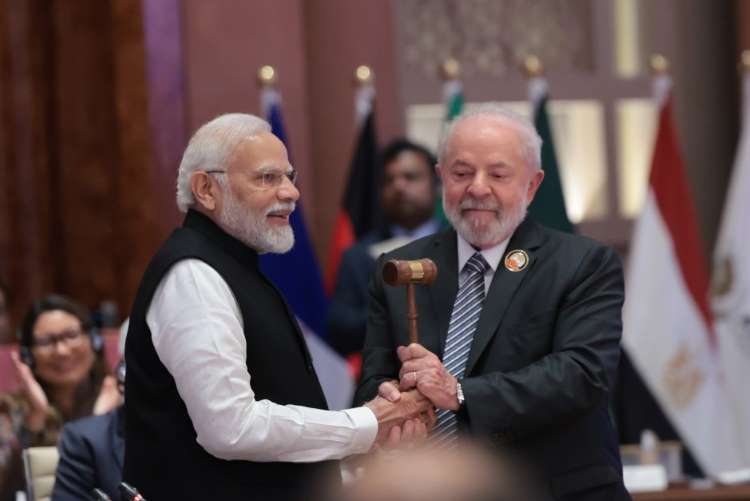The G20 New Delhi Declaration covers a wide range of issues, including the global economy, climate change, and sustainable development. The G20 leaders committed to ensure that the benefits of economic growth are shared by all, and that no one is left behind. They will do this by promoting equitable growth policies, such as investing in education and healthcare, and by strengthening macroeconomic and financial stability. They promised to work together to ensure that exchange rates are not manipulated for competitive purposes. They will do this by monitoring exchange rates closely and by acting against any countries that they believe are engaging in currency manipulation.
They endorsed the Financial Stability Board’s recommendations for regulating, supervising, and overseeing crypto assets and activities. The FSB is an international organisation that monitors and makes recommendations on the global financial system. Its recommendations are designed to help prevent financial crises and protect investors. The G20 finance ministers and central bank governors will discuss the next steps for regulating crypto assets at their meeting in October. They will consider the FSB’s recommendations and other factors, such as the potential risks and benefits of crypto assets.
The G20 leaders asked the Financial Stability Board (FSB) and other standard-setting bodies to help ensure that regulations for crypto assets are implemented effectively and consistently around the world. This will help prevent countries from using different regulations to gain an unfair advantage over each other.
READ I Pakistan economy weighed down by inflation, dwindling reserves
The G20 leaders agreed to ensure that all countries have a fair chance to compete in the global economy. They will do this by discouraging protectionism, which is the use of government policies to protect domestic industries from foreign competition. They will also work to prevent market-distorting practices, such as subsidies and dumping.
This commitments could be achieved through a combination of policies, such as fiscal stimulus, monetary policy easing, and investment in infrastructure. Fiscal stimulus involves increasing government spending or cutting taxes in order to boost economic activity. Monetary policy easing involves lowering interest rates or increasing the money supply in order to make it cheaper for businesses and consumers to borrow money. Investment in infrastructure can help to create jobs and boost economic growth.
This commitment will be achieved through a variety of measures, such as reducing greenhouse gas emissions, investing in renewable energy, and adapting to the impacts of climate change. Reducing greenhouse gas emissions can be achieved through measures such as switching to cleaner fuels, improving energy efficiency, and planting trees. Investing in renewable energy can help to reduce reliance on fossil fuels and create jobs in the clean energy sector. Adapting to the impacts of climate change can involve measures such as building seawalls to protect coastal communities from rising sea levels.
This will be achieved through policies that promote economic growth that is environmentally friendly and that benefits all people. Environmentally friendly economic growth can be achieved through measures such as investing in renewable energy and energy efficiency. Economic growth that benefits all people can be achieved through measures such as reducing poverty and inequality.
Delhi Declaration: Impact on global economy
The impact of the G20 New Delhi declaration on the world economy will depend on a number of factors, including the willingness of the leaders to implement the commitments, the state of the global economy, and the effectiveness of the policies that are implemented. However, the declaration has the potential to be a positive force for the world economy.
The declaration accepts the challenges that the G20 will face in implementing the commitments. The global economy is still recovering from the COVID-19 pandemic. This makes it difficult to implement policies that could boost economic growth without causing inflation. There is also a lack of consensus among the G20 countries on how to address climate change. This could make it difficult to implement policies that are effective in reducing greenhouse gas emissions.
There is also a growing inequality gap between rich and poor countries. This could make it difficult to achieve sustainable development.
Despite these challenges, the G20 has the potential to make a positive impact on the world economy. If the leaders are willing to work together and make the necessary sacrifices, the declaration could help to boost economic growth, reduce poverty, and protect the environment.
The G20 New Delhi declaration could impact the world economy in several other ways. It could help to stabilise the global financial system, and promote free trade and investment. It is also likely to improve global governance. The biggest impact, however, will be in addressing the challenges of climate change and sustainable development.
The G20 New Delhi Declaration commits the leaders of the world’s 20 largest economies to accelerate strong, sustainable, balanced, and inclusive growth, take urgent action to address climate change, and promote sustainable development. It is ambitious and challenging, but it also provides a roadmap for a better future. If the leaders are willing to work together and make the necessary sacrifices, the declaration could help to boost economic growth, reduce poverty, and protect the environment.
The declaration also faces some challenges such as the global economic recovery from the COVID-19 pandemic, the lack of consensus on climate change, and the growing inequality gap. However, the G20 has the potential to overcome these challenges and make a positive impact on the world economy. The declaration is a reminder that we need to act now to address the challenges facing our planet. The declaration provides a roadmap for a better future, but it is up to us to make it happen.

